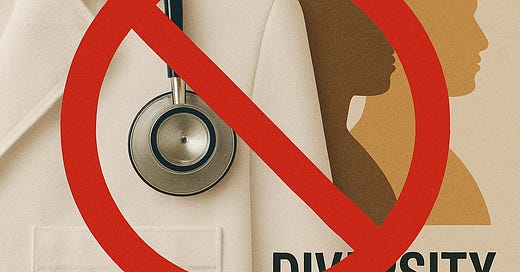GOP Bill threatens Diversity Programs in Medicine
HR3518 is the latest attack in this administration's war against DEI, and could spell doom for our healthcare system and future doctors alike
Last week, US Representative and trained urologist Greg Murphy (R-NC-3), introduced HR3518, otherwise known as the EDUCATE Act. This bill would eliminate all federal funding to medical schools who adopt certain policies and programming related to diversity. This not only includes acknowledging systemic racism in the US and incorporating diversity education in their curricula, but even just having a Diversity Office itself.
As someone with a firm commitment to competently treating diverse populations and who values diversity in the medical workforce, this bill horrified me. But despite this bill’s massive implications and my strong opposition, I have seen relatively little mainstream coverage of this issue.
Let’s talk about Diversity, Equity, and Inclusion (DEI) in medicine and why it is important.
The US unfortunately has a long history of systemic racism in nearly all facets of medicine - ranging from barring black applicants admission to the profession, unethical experimentation that has harmed countless black participants, and implicit bias on behalf of healthcare workers that lead to gaps in care and poor health outcomes. I encourage anyone interested in these topics to read The Immortal Life of Henrietta Lacks and Medical Apartheid, which greatly informed my thoughts on these issues.
Today, those legacies live on in the form of massive healthcare disparities across racial lines, affecting everything from maternal mortality, unequal pain treatment, organ allocation, and insurance risk scores. Given the sheer amount of our national budget dedicated towards exploding healthcare costs, addressing these large disparities is not only in our social best interest, but economic best interest as well. It has been estimated that inequities in healthcare have cost the US upwards of $300 billion in excess spending and lost productivity. This estimate is projected to increase to over $1 trillion over the next two decades due to rising per capita healthcare costs across the board.
Additionally, as someone who does health equity research myself, I found this bill to be disregarding of decades of scientific work done by thousands of researchers identifying and characterizing these disparities.
The goal of DEI policy is to confront this reality head-on - not to shame anyone, but to train physicians who can care for people of all backgrounds safely and equitably. The next generation of trainees should be aware of the history of healthcare in the US to better understand the context in which they practice. Education about healthcare disparities and implicit biases among healthcare workers is an essential part of any medical school curriculum.
Furthermore, a wealth of recent research has shown that greater healthcare workforce diversity leads to improved patient outcomes, primarily through increased trust and communication between physicians and patients, providing culturally-sensitive care, and expanding access to care in underserved communities, where non-white physicians are more likely to practice than their white peers.
Despite this promising data and significant efforts to improve clinician diversity, we still have a long way to go as a profession. Only about 6% of doctors are black, while comprising about 13% of the US population. Only about 5% of doctors are hispanic, while comprising about 18% of the US population. These percentages dip lower when looking at the most competitive of specialties. Numbers like these are why diversity offices exist in the first place - to aid in recruitment and support of underrepresented medical students during their training. Before being outlawed by the Supreme Court in 2023, affirmative action admissions policies were an important, albeit controversial, part of this effort. In general, DEI efforts acknowledge that the opportunities people have to pursue a career in medicine is not equal among different communities and seeks to level the playing field and promote meritocracy, as opposed to undermining it as some critics claim.
The tone of the text in this bill seemed to suggest that it was intended to uphold meritocracy and prevent ideological coercion. Ironically, I see this bill as inherently ideologically coercive and akin to a gag order. In addition to withholding funding, this bill would even apply pressure on the Liason Committee for Medical Education, the body which accredits medical schools in the US, to withhold accreditation for schools that remain committed to diversity and include any DEI education in their curricula - essentially forcing them to adopt the same stance towards DEI as the Republican Party.
This seems to be the latest attack in this administration’s broader war against DEI in American higher education. Earlier this year through executive action, the Trump administration revised NIH indirect research funding rates for universities. Many colleges, under threat of losing millions, retaliated by initiating litigation. I aim to touch on this deeper in another post.
Unfortunately, there is not much our institutions can do given their immense reliance on federal funding. And in a sense, they are on a ticking clock too. The budgets of universities are designed with the expectation that they will get a certain amount of funding from the government each year. Let’s say this bill gets passed and medical schools sue. Even if they draw out the issue in the courts, every year they do not receive funding, they will suffer extreme financial harm, risking thousands of jobs and their ability to maintain their core functions. Schools will have no choice but to capitulate to the demands of the government.
Consider this in the context of the fact that our healthcare system is already hanging on by a thread - crippled by physician shortages, exploding costs, reduced research funding, and administrative bloat. Instead of spending time thoughtfully evaluating these issues and proposing genuine solutions, it seems like Congress prefers to waste resources backtracking on the progress we’ve made towards a fundamental issue.
What I’m Reading, Watching, and Listening To:
Iz It a Crime? - Snoop Dogg
Succession - Jesse Armstrong
I’m a Black Doctor. I Nearly Died Giving Birth - Bayo Curry-Winchell



